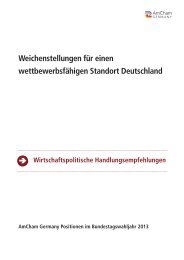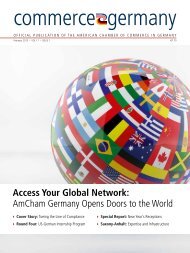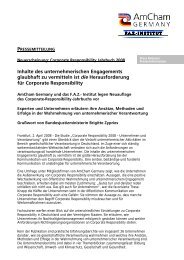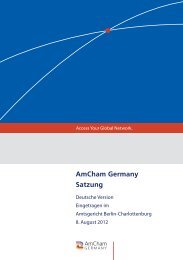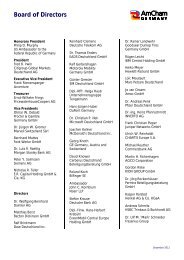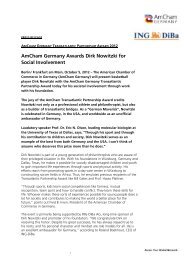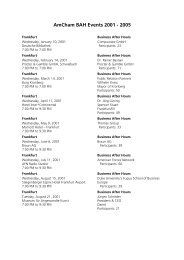Issue 4 - AmCham Germany
Issue 4 - AmCham Germany
Issue 4 - AmCham Germany
You also want an ePaper? Increase the reach of your titles
YUMPU automatically turns print PDFs into web optimized ePapers that Google loves.
member point of view<br />
TTIP: A Game Changer<br />
for the Auto Industry<br />
Sector a major stakeholder Harmonization possible Strong political support across the aisle<br />
Over the last few decades, General<br />
Motors and Opel have often worked<br />
together to navigate stormy business<br />
weather. Sharing the same set of values<br />
and traditions on both sides of the Atlantic<br />
has helped them manage challenges in the past<br />
and will form the foundation for their transatlantic<br />
cooperation in the future. This joint strategy<br />
will be impacted by the Transatlantic Trade<br />
and Investment Partnership (TTIP) agreement in<br />
myriad ways.<br />
The automotive industry represents the largest<br />
manufacturing and export sector in both<br />
Europe and the US, so it has a major stake in<br />
the successful conclusion of TTIP negotiations.<br />
The US and the EU together account for 32%<br />
of global auto production and 35% of global<br />
auto sales. Especially significant is US-EU autorelated<br />
trade, which accounts for 10% of all trade<br />
between the two economies. There remains<br />
ample room for expansion, however, since the<br />
transatlantic market for automobiles is still<br />
impeded by tariffs and regulatory differences.<br />
With a joint submission to US and European<br />
authorities, the auto industries in both regions<br />
have called for an ambitious agreement to<br />
address tariff and nontariff barriers. GM and Opel<br />
welcome the launch of the negotiations and are<br />
convinced that they could be a game changer for<br />
the auto industry.<br />
Our goal is to be able to sell new car models<br />
in both the US and the EU without having to<br />
change the technical specifications.<br />
We see particularly good prospects for harmonization<br />
in areas where new regulations are<br />
needed, for instance, concerning emerging vehicle<br />
categories and urban mobility issues. We welcome<br />
regulators’ recent successes regarding the<br />
charging interfaces of electric vehicles, standards<br />
for hydrogen cars, globally harmonized emissions<br />
and fuel economy. After all, emissions regulations<br />
and safety issues will be among the most important<br />
issues for TTIP.<br />
To ensure a positive outcome for the negotiations,<br />
politicians must recognize the equivalence<br />
of existing regulations. Despite decades of<br />
collaboration, US and EU test procedures and<br />
requirements remain different, though they<br />
address the same issues. The strong political support<br />
on both sides of the Atlantic will help overcome<br />
the challenges of regulatory convergence,<br />
which will require outside-the-box thinking and<br />
flexibility from all parties. The end result should<br />
be lower engineering costs, reduced prices for<br />
consumers and an extended product offering.<br />
The auto industry has fully embraced the TTIP<br />
initiative. Now is the time to demonstrate that<br />
these long-standing partners can give a renewed<br />
push for trade and thus contribute to muchneeded<br />
global growth.<br />
<br />
Dr. Karl-Thomas Neumann<br />
CEO, Adam Opel AG<br />
Executive Vice President<br />
and President, GM Europe<br />
Adam Opel AG<br />
Bahnhofsplatz<br />
65423 Rüsselsheim<br />
T +49 6142 770<br />
E info@opel.com<br />
W www.opel.com<br />
September 2013 commerce germany 17



